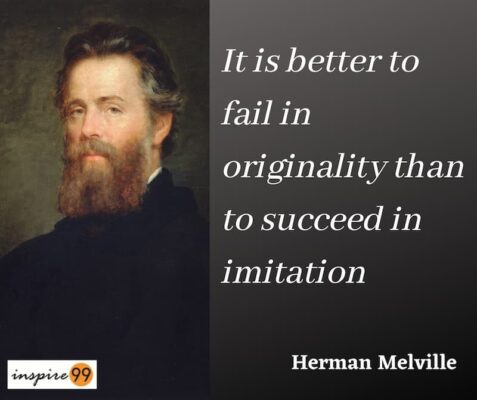The quote “It is better to fail in originality than to succeed in imitation” by Herman Melville urges us to embrace our indviduality. It highlights the importance of being ourselves. Copying someone else may give us some quick wins. However, will they sustain over the long run?
Imitation can get us some glory, but even the best copy of something is still a copy. It might just end up making the original creator more famous. Having said that, we can see some successes in imitation, but truth is that authenticity is more valued in general. In this article, we will explore the meaning behind this quote, analyze its key messages, and explore the cautionary aspects of drawing inspiration from it.
It is better to fail in originality than to succeed in imitation Meaning
This quote encourages us to break free from the shackles of imitation. It is a resounding call to explore our originality. The quote inspiringly says that it is better to fail at being ourselves than succeeding at being someone else. I can appreciate that being ourselves can be scary. It is even more so when everyone around us can be judgemental. This induces a fear of failure, sometimes even preventing us from trying something. Unfortauntely, this fear can be debilitating if you aren’t careful to keep it in check.

If we are faced in such fearful moments, maybe we can take refuge from this quote – It is better to fail in originality than to succeed in imitation. Embracing authenticity and creativity allows us to develop unique ideas and perspectives. Ultimately it leads us to a more fulfilling and genuine life journey.
Key messages from the quote – It is better to fail in originality than to succeed in imitation
- Value in Originality: The quote highlights the importance of daring to be different and taking risks in expressing our ideas and creativity. Originality sets individuals apart from the crowd, fostering a sense of identity and purpose.
- Embracing Failure: Melville’s quote teaches us that failure is not something to be feared but embraced. Failing in the pursuit of originality is a valuable learning experience that can pave the way for future successes and personal growth.
- Avoiding Imitation: The quote cautions against blindly imitating others’ achievements or conforming to societal expectations. Succumbing to imitation can lead to a lack of fulfillment and a sense of emptiness, as we lose our individuality in the pursuit of shallow success.
Being Cautious with Inspiration:
While the quote encourages originality, it is essential to approach it with mindful consideration:
- Learn from Others: Taking inspiration from others’ work is not inherently negative. It is crucial to learn from and build upon the knowledge and successes of those who came before us.
- Authenticity in Imitation: There is a fine line between imitation and adaptation. If drawing from others’ ideas, strive to infuse them with your unique perspective and style, making it an authentic creation.
- Balancing Risks: Embracing originality comes with risks, and it is essential to find a balance between boldness and practicality. Take calculated risks, and be open to reassessing and refining your approach as needed.
Conclusion: Inspiring message from Herman Melville to be yourself
Herman Melville’s quote reminds us that the pursuit of originality and creativity is more fulfilling and meaningful than the path of imitation and conformity. Embrace your uniqueness, learn from failures, and stay true to your authentic self. While drawing inspiration from others, always infuse your work with your distinct voice and perspective. Embracing originality may involve risks, but it leads to personal growth and a life enriched with purpose and fulfillment.
It is better to fail in originality than to succeed in imitation
Herman Melville (https://www.goodreads.com/author/quotes/1624.Herman_Melville)
About Herman Melville
Herman Melville (1819-1891) was an American novelist, short story writer, and poet. He is best known for his masterpiece “Moby-Dick.” Born in New York City, Melville worked as a sailor on whaling ships and explored the South Seas. His literary works explored adventure, human nature, and the struggle between good and evil.
While not widely recognized during his lifetime, Melville’s reputation grew posthumously. “Moby-Dick” is now regarded as one of the greatest works in American literature. His writings continue to captivate readers worldwide, showcasing profound insights into the human spirit and the mysteries of the sea. More about Herman Melville: https://en.wikipedia.org/wiki/Herman_Melville